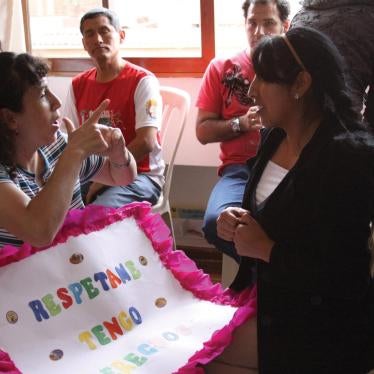Human Rights Watch is an independent, non-governmental organization dedicated to defending and protecting human rights in more than 90 countries. We have researched the rights of persons with disabilities around the world, including in a number of countries in Latin America.
We would like to share with you concerns regarding the draft law for people with disabilities that would replace law 29973, the General Law on Persons with Disabilities, adopted in 2012. We welcome the commission’s interest in promoting new steps to further inclusion and enhance rights protection for people with disabilities in Peru. At the same time, we would like to call your attention to the following issues:
Consultation with people with disabilities
As your Excellency is aware, the 2012 General Law on Persons with Disabilities came into force with a national consensus among people with disabilities and their representative organizations. Eighty thousand persons in Peru supported with their signature the process for the creation of the law, which established a special commission to reform the Civil Code in Peru and other legislation to establish full legal capacity for people with disabilities. This remains one of the most advanced laws on legal capacity for people with disabilities in the world.
We are concerned that for the new draft law, the Commission on Inclusion and People with Disabilities has not consulted sufficiently with organizations for people with disabilities across Peru. There was no public call to solicit the input of people with disabilities on the draft law.
The Convention on the Rights of Persons with Disabilities (CRPD), which Peru ratified on December 2008, requires that states to consult closely with people with disabilities and their representative organizations on “the development and implementation of legislation and policies to implement the present Convention, and in other decision-making processes concerning issues relating to persons with disabilities” (art. 4.3). The Committee on the Rights of Persons with Disabilities, which monitors states’ implementation of the CRPD, in its General Comment 7, said that “consultations with and the involvement of persons with disabilities” should be considered as a “mandatory step prior to the approval of laws, regulations and policies, whether mainstream or disability specific.”
Recommendation: organize a broad consultation process, with a clear timeline, explaining how the views of people with disabilities are incorporated into the draft law, as well as the national and international legal underpinning of the proposed amendments.
Access to free legal counsel
Under the current law, people with disabilities can access free legal counsel through the Ministry of Justice and Human Rights irrespective of their economic circumstances, as is the case for other groups such as victims of violence and people with irregular migration status at risk of deportation. The proposed amendment (art. 10.3) will require the ministry to grant people with disabilities access to free legal counsel only if they demonstrate a need on the basis of an assessment of the household economic situation (Sistema de Focalización de Hogares, SISFOH). For others, the assessment is based on individual economic circumstances—not those of the household.
Article 13 of the CRPD guarantees people with disabilities access to justice on an equal basis with others, including access to legal counsel and advice.
Requiring an assessment of household economic circumstances, rather than individual economic circumstances, for people with disabilities to access free legal advice creates an additional obstacle for them to access justice. There is no requirement or guarantee under the bill that family members will pay for legal counsel when a person with a disability needs it. In the absence of effective access to justice, people with disabilities are at risk of enduring rights violations without recourse.
Recommendation: When determining eligibility for free legal counsel, the ministry should apply the same method of evaluating ability to pay irrespective of whether a person has a disability.
Personal assistance services delivered in residential institutions
The proposed amendment to article 84 of the law allows for personal assistance to be provided to people with disabilities in residential institutions. This measure should be used to improve the situation for people with disabilities who are temporarily in residential institutions or are awaiting de-institutionalization, but should not reinforce the use of institutions for people with disabilities by directing additional services toward institutions. It is vital that the provision of personal assistance to people with disabilities in residential institutions does not undermine of detract from resources that should be directed to ensure people with disabilities can secure their right to live in the community with support.
Article 19 of the CRPD states that people with disabilities have the right to live independently and be included in the community, to choose where, how, and with whom to live. For some people with disabilities, this independence can be supported by personal assistants whom the user chooses and directs. The role of a personal assistant, who provides support to people with disabilities to live independently and chosen by the individual, is entirely distinct from that of staff hired and supervised by an institution to provide care to those inside the institution.
Recommendation: Ensure that any resources allocated to services in closed institutions do not come from resources available services to support people with disabilities to live independently in the community, and ensure the provision of personal assistance to people with disabilities in residential institutions does not undermine or slow plans for deinstitutionalization.
Rights-respecting language and nomenclature
Most of the amendments to the current law involve changes in nomenclature and terminology, such as replacing “persons with disabilities” with “persons in a situation of disability.” “Persons in a situation of disability” is not recognized language within the disability community and is not consistent with the nomenclature of the CRPD or the Committee on the Rights of Persons with Disabilities. It is unclear how such a change in nomenclature would improve the rights of people with disabilities. We urge the commission to eliminate these changes.
Recommendation: Continue using the term “people with disabilities” in this and other pieces of legislation.
Ms. Vásquez Chuquilin, given these shortcomings and the broad, continuing consensus in support of the 2012 law, we urge you to consider, in consultation with people with disabilities, the utility of a largely new disability law, which would entail redrafting the bylaws and enabling regulations required to implement the law and ensure the rights of people with disabilities. In Human Rights Watch’s view, the proposed legislation appears to do little to bolster rights of people with disabilities in Peru and would, instead, interrupt the ongoing process of implementation of the current law.






